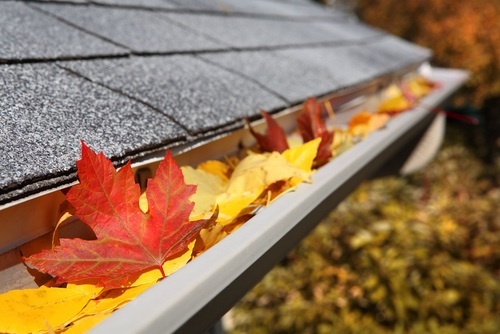
by Flagship Staff | Oct 5, 2015 | Blog

Fall is officially here and the days are definitely getting shorter. If you’re like me, you’re trying to savor the remaining warm days as much as possible. If you’re also like me, however, fall allergies can make it difficult to enjoy this time of year.
It’s easy to understand why you might suffer from allergies in the spring. The snow has melted and the world around us goes into full bloom. But what’s up with fall allergies?
Ragweed and mold are the two big culprits in fall. Ragweed thrives in the warm sunny days and cool nights. The release of ragweed pollen usually starts in August but can continue through September and October.
Mold is the other culprit. Mold thrives in damp cool places. As leaves and other yard debris pile up, our yards become conducive environments for mold growth.
Mold spores and pollen love to ride the wind, so even if your area is free of these allergens, a windy day can bring them to your neighborhood.
Here are some tips to reduce allergy symptoms and enjoy the remaining warm sunny fall days.
1.Keep the air conditioning on. My wife loves to open the windows this time of year. Warm daily temperatures and cool nights are perfect for a comfortable home. I enjoy driving with the windows down and the moon roof open. If your allergies are kicking up, however, it’s best to keep the windows closed and the air conditioning on. By doing this, you keep allergens out.
2.Change your exercise routine. If you enjoy an early evening run or walk, you may want to switch to an early morning routine. Ragweed is spread when the winds pick up. According to WebMD, the pollen counts are highest between 10:00am and 4:00pm.
3.After washing your clothes, don’t hang them outside to dry. Pollen gets trapped in your clothes or linens.
4.Shower after outdoor activities. If you spent the day doing yard work, playing golf, or enjoying a pumpkin farm, take a shower afterwards. A shower will rinse the pollen off your skin and out of your hair. Also, throw your clothes in the wash to avoid spreading the allergens throughout your home.
5.Change your air conditioner filter frequently. While this is an easy tip, it’s one I often neglect. Experts recommend changing the filter monthly. If you’re an allergy sufferer, a hypoallergenic filter is recommended. I usually cringe at the price of these filters, but if they help keep your home allergen free, they’re worth it.
6.Check your weather app. Weather apps provide all kinds of helpful information. Consider downloading an app that provides pollen counts. I have the Weather Channel® app and it provides pollen counts for trees, grass, and weeds.
7.Take allergy medication consistently. From April 1 until the first hard frost, I use two nasal sprays and take an oral antihistamine. As my symptoms improve, however, I get lazy and don’t take the medications as I should. The key to allergy relief is consistency. Before taking any medications, please consult your medical professional.
8.Clean your home regularly. Cleaning your home regularly can minimize allergens (mold, pollen, dust mites, pet dander) in your home. Keep in mind the cleaning process doesn’t have to be a big production. Simply vacuuming, dusting, and washing bed linens can be beneficial.
by Flagship Staff | Oct 2, 2015 | Blog

If you own a cabin or summer home, I’m sure Labor Day is bitter sweet for you. It’s the last long summer weekend, but it can also be a weekend with a lot of work. Yes, for many, this is the time of year when you decide to close the property for the season.
While it can be a sad time of year for those who love the summer heat and everything summer has to offer, it’s important to cherish all the fond memories and to think about how to close down your summer home or cottage safely.
The list below offers a number of things to consider when shutting down your cabin for the winter.
1. Inspect your property – Take a walk around the inside and outside of your property to see if anything has been damaged. Create a checklist based of what you find and decide if it’s something that should be fixed now or when you open your home next spring. Items to inspect include your roof, chimney, eaves troughs, siding, foundation, trees that are leaning over your property, and out buildings.
2. Turn off the water – Turn off the water at the main supply point to prevent freezing pipes. Even if you keep your home heated during the winter, this is important in case your furnace fails or the power goes out.
3. Open your faucets and drain all water lines, including your appliances – Even if you turn off the water at the main supply into the home, it’s also important to drain the excess water from the water lines that run to your appliances, sinks, and toilets.
4. Temperature monitoring system – If you heat your home during the winter, consider purchasing a temperature-monitoring system. Consider a system that sends email alerts to him if his summer home’s temperature drops below 55 degrees Fahrenheit.
5. Water flow monitoring systems – If you choose to leave your water on during the winter, consider purchasing a water flow monitoring system. A water flow monitoring system is attached to your water main and protects your entire house. The system works by measuring water flow into your house. If it detects continuous water flow beyond the normal stopping and starting of your every day appliances, it stops the flow of water into your house automatically.
6. Empty and clean your appliances
• Refrigerator/freezer – Remove all food and wipe them down with a disinfectant that kills bacteria. After you’ve cleaned it, consider leaving your refrigerator/freezer doors slightly ajar to prevent mold and mildew growth. This will also prevent smells from getting into the plastic. Consider putting a box of baking soda inside.
• Oven – Like your refrigerator, wipe it down with a disinfectant that kills bacteria and unplug it or turn off the gas.
• Washing machine/dryer – If you’re lucky enough to have these appliances at your summer home, disconnect the hoses and unplug them. If you want to disinfect your washing machine, consider running a normal cycle with vinegar or whatever cleanser your manufacturer recommends.
• Water heater – Drain your water heater and turn off the gas or switch it to vacation mode.
7. Store outdoor furniture and other expensive items in a locked garage or shed – If there isn’t storage space available on your property, consider renting a storage unit. A nice size storage unit will allow you to store outdoor furniture, bikes, small boats, and other summer toys that could be damaged if left outdoors.
8. Unplug your appliances and electronics – This tip will protect your appliances and electronics from power surges and lightning strikes.
9. Create a home inventory for your cabin – If your cabin was destroyed in a fire or by an early spring tornado, would you remember every possession you had in it?
10. Take your valuables home or consider a security system – Vacated cabins can become easy targets for thieves during the winter months. If you prefer to leave valuables in the home, consider installing a security system.
11. Inspect your fireplace – If you have a wood burning fireplace that you’ve used for a number of years without cleaning, consider having it inspected and cleaned by a reputable chimney sweep. Creosote is a residue that travels up your chimney and builds up on your flue over time. In fact, some creosote builds up every time a wood burning fireplace is lit. If that residue isn’t properly cleaned out, the chance of a fire igniting in your chimney increases.
12. Partner with your neighbors or local police – If you have neighbors or friends who live near your summer home all year round, consider asking them to check on your home periodically. Also leave contact information with your neighbors or local police. Contact information should include your cell phone number, home phone number, and your e-mail address.
Creating a routine each time you leave your home empty for an extended period of time can reduce the likelihood of a disaster and keep work to a minimum when you return.

by Flagship Staff | Oct 2, 2015 | Blog

Gutters divert rain away from your home and are its first line of defense against water damage. However, as autumn progresses, leaves, twigs and other debris can clog your gutters and cause significant damage to your home.
When your gutters are obstructed, you may start to notice overflows and icicles. If you don’t quickly do something about these obstructions, water that can’t drain will eventually find the path of least resistance, which often leads into your home’s foundation or walls. This can cause major structural damage that often goes unnoticed until it’s too late. In areas that experience below-freezing temperatures, the water in your gutters, foundation and walls can freeze and expand, causing even greater damage.
The amount of foliage in your yard can impact how often you should clean your gutters, but, as a general rule of thumb, it should be done at least once a year and preferably both in the autumn and spring. You should never attempt to clean your gutters in slippery, windy or icy conditions.
Before you clean your gutters, make sure you have the right tools for the job, including a functional and safe ladder, garden trowel, dust mask, gloves and eye protection. Use the ladder to reach the gutters and dislodge any debris within arm’s reach; then, descend the ladder and move it in order to clean the next section. Don’t overreach or attempt to move the ladder while you are still on it. After you’ve removed all noticeable debris, use a garden hose to clear out the remaining dust and to test for any additional obstructions.
Since a ladder is needed to clean out debris, you may want to hire a roofing professional, who can also identify any leaks, damage or misalignment in your gutter system.
by Flagship Staff | Jun 30, 2015 | Blog
Outdoor tips to keep your family safe this summer
With July 4 upon us, many families have plans or are making plans for a weekend getaway or vacation. Whether you’re a veteran or a beginner, here are some safety tips for camping, boating, riding an ATV, or using fireworks.
Camping Safety Tips
1. Familiarize yourself with your campsite. Many times when we go camping, the car doors fly open and the kids are off as soon as we get to the campsite. While I know everybody is excited, it’s best to take a step back and look at the site first.
Some things to look for are:
Smoldering fires from the previous camper
Broken glass
Tree stumps
The slope of the site
Insects or poison ivy
Any leftover food that may attract animals.
2. Take plenty of water. Depending on where you’re camping, you may have access to streams or natural springs. While it may look clean to drink, it probably isn’t. If you’re really roughing it and the amount of water you can take is limited, iodine tablets can be used to purify water.
3. Pack antihistamines. For seasonal allergy sufferers, antihistamines are necessary. In addition, antihistamines are also very useful for those unexpected allergic reactions to bee stings, poison ivy, etc.
When I was growing up, my dad got stung by a bee and had a severe allergic reaction. It had never happened before so we had no idea he was allergic to them. In this instance, we had to call 911.
4. Notify family or friends. Before heading out on your camping adventure, tell family or friends where you’re going and when you expect to return.
Boating Safety Tips
1. Don’t drink and drive. This common-sense tip also applies to boating. According to the U.S. Coast Guard, alcohol was the leading cause of fatal boating accidents in 2013 where the primary cause was known. The effects of alcohol are amplified because of sun exposure, wind, and noise.
The boat traffic can be very heavy depending on the size of the lake. Staying alert is key to keeping your passengers, as well as other boaters and swimmers, safe.
2. Wear your lifejacket. Each person on board should have a U.S. Coast Guard-approved life jacket. If you decide you’re not going to wear it, make sure it’s easily accessible. You never know when a serious situation is going to arise.
3. Keep a watchful eye on the weather. Weather patterns can quickly change during hot summer months. Watch for changes in the wind direction and listen for thunder off in the distance. Take along a weather radio or SMART phone to help monitor the weather.
ATV Safety Tips
1. Take a rider safety course. If you’ve never ridden an ATV, and this is a new hobby, it’s wise to take a rider safety course. Many people jump on an ATV and away they go. So many unexpected things can happen, especially to an inexperienced rider. These vehicles are fast, and handling one in an emergency is much different than a car.
Always wear a helmet. An unexpected rut or bump can send you flying, maybe straight into a tree.
2. Wear appropriate clothing. Shorts and flip-flops are not appropriate clothing. When riding an ATV, you should wear:
Goggles
Long sleeve shirts
Pants
Gloves
3. Pick the right ATV. If you’re buying or renting an ATV, make sure it’s the right size. You should never ride or allow your child to ride an ATV that’s too big in size and horsepower. Again, they handle and react very differently from other modes of transportation.
Fireworks Safety Tips
1. Only competent adults should handle fireworks. If you’re nervous about using fireworks or you’ve had too much to drink, please leave them alone. Children should never be allowed to light them. Injuries often occur when the person handling the fireworks is inexperienced and/or judgment impaired. Most injuries are to hands and faces.
2. After fireworks burn out, toss them in a bucket of water or spray them with a hose. Pay special attention to sparklers. While they seem like one of the safest fireworks, they burn at a temperature close to 2,000 degrees. If your child drops a sparkler, tell him/her to leave it on the ground because it’s hard to tell which end is safe to pick up. Spray the sparkler immediately to put it out.
3. If you’re lighting fireworks that launch into the sky, plan for their landing in a safe area. Over the years, I’ve had the neighbor’s fireworks land on my roof, which I wasn’t very happy about. Please be mindful of the wind direction.

by Flagship Staff | Jun 22, 2015 | Blog
Many people use social media to keep in contact with friends and family, but burglars can use what you share online to know when your house isn’t occupied. Here are some tips to deter would-be thieves:
- Don’t share when you and your family will be out of the house for extended periods of time.
- Don’t use Facebook or other applications to check in with your physical location.
- Make sure that those traveling with you are not sharing your location without your permission.
- Wait until you are home to post photos from a vacation.
- Update social media sites to give the impression that you are home.
- Remember to check the privacy and location settings on your mobile phone and social media sites.







